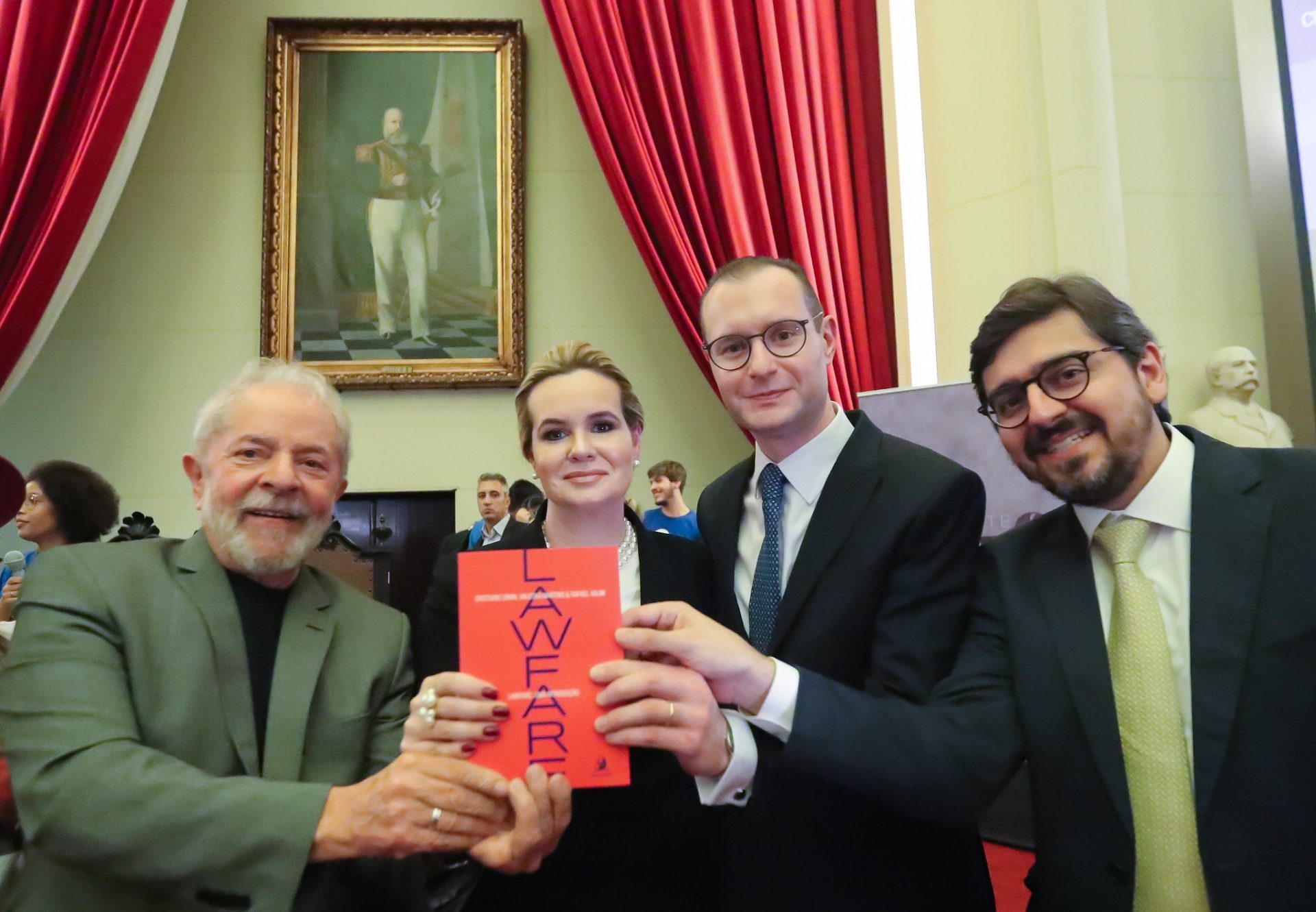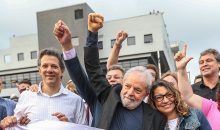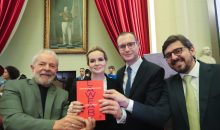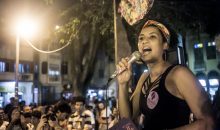“A partnership between Moro and the US aimed at destroying Lula da Silva”, the former president’s lawyers say

During an interview with the DN at the launching in Portugal of the book Lawfare: An Introduction, the lawyers of the former metalworker, who was president between 2003 and 2010, also state that without the legal war Bolsonaro wouldn’t be president of Brazil today.
Lula da Silva’s lawyers believe in a shared interests partnership between Operation Car Wash leaders and the US administration to accuse Lula da Silva and thus cut him out of the 2018 elections race, which ended up being won by Jair Bolsonaro. Without this legal war, Bolsonaro, who would later appoint Operation Car Wash judge Sergio Moro as a “super” minister of Justice and Public Security post in his administration, Bolsonaro would not have won, Cristiano Zanin and Valeska Zanin Martins stated to the DN, alongside the also jurist and author of “Lawfare: An Introduction”, Rafael Valim.
The book, which has been available for purchase in Brazil for almost one year, was launched in Portugal this week, edited by Almedina with the preface by Francisco Louçã.
Here’s the talk with the three authors about the book “Lawfare: An Introduction” and also about the former president Lula da Silva.
Lula is or has been the object of dozens of proceedings. Doesn’t it get somewhat difficult to claim before the public opinion that all these proceedings are just due to a political war?
Cristiano Zanin: All the processes have in common the fact that they lack evidence. These are accusatory hypotheses built not based on concrete elements, but based on “conviction”, that is, what some members of the Brazilian Justice System who do not like former president Lula imagined to put him in prison and to withdraw him from politics. So much so that up until now we have managed to acquit Lula in five cases in which the former president was tried outside the Operation Car Wash in Curitiba. That is, when impartial and independent judges analyzed the accusations in the light of the defense we have presented, they acquitted Lula. Only in the lawsuits originated in Curitiba, where Lula da Silva’s condemnation was predefined, has this result not yet occurred. But we have the real expectation that these Operation Car Wash of Curitiba cases will be annulled by the Federal Supreme Court given the indisputable partiality of the then judge Sergio Moro, who conducted all the instructions and even tried one of them.
We have an habeas corpus that has been pending judgment since December 2018 at the Supreme Court, which was greatly reinforced by the incredible dialogues between prosecutors and the then judge Sergio Moro disclosed by the series that became known in Brazil as Vaza Jato (Leak Express), captained by The Intercept portal in Brazil. The fact is that, even with all the media campaigns and psychological operations carried out by Operation Car Wash, our technical work, associated with some recent facts, ended up bringing up the lawfare practiced against Lula da Silva. This is being noticed by a significant part of the population and also reflecting in the processes involving the ex-president.
So what are the moments during the proceedings that illustrate the lawfare?
Cristiano Zanin: All the proceedings filed against the former president Lula da Silva lack evidence and sought to meet political ends, including cutting him out of the 2018 elections race, and thus they all take part in the lawfare we have been denouncing since 2016.
On the other hand, there’s no doubt that the reason why these proceedings were filed is the partial action of the then judge Sergio Moro, of Operation Car Wash prosecutors in Curitiba and the strategic informal collaboration they established with American authorities. Moro and the prosecutors have used the law as a weapon against Lula da Silva because they wanted to destroy him.
To enable this illegitimate action, being it the nature of lawfare, they were granted significant support of part of the media to promote a campaign to create an artificial atmosphere of guilt against Lula da Silva. Part of the Brazilian media dedicated many hours of broadcast and many newspaper and magazine pages to attack Lula da Silva exclusively grounded on what was published by Operation Car Wash.
The Car Wash agents have also used psychological operations, established in manuals, to manage the people’s perception in disfavor of the former president and his defense team. So, lawfare is a practice that has well-defined tactics and techniques as we have shown in this book now launching in Portugal. All of them are present in the former president Lula da Silva’s cases.
Moro and the US would then be behind the proceedings against Lula da Silva?
Valeska Martins: Stemming from the evidence we have gathered throughout recent years, we concluded that there has been a combination of US geopolitical interests and personal interests of some of the Brazilian Justice System agents who participated in Operation Car Wash.
After discovering oil reserves in the pre-salt layer and defining its sharing, Brazil has become a US target. So much so that in 2013 the first attack occurred as the US spied on Petrobras, and on the then-president Dilma Rousseff as well as high-level members of her administration.
There was a desire from the US of a game change and they saw in the Brazilian Justice System their best ally to do so. As evidence of this, we have annexed in the proceedings a video in which an American prosecutor clearly stated, during a meeting with the then Brazil’s Prosecutor General in 2017, that he had forged an alliance with Brazilian prosecutors based on “trust” and outside the official channels to build on accusations against Lula da Silva.
It has only been possible because the then judge Sergio Moro and the Car Wash prosecutors wanted fame and power and also because they had the ambition to give lectures which had the accusations against the former president Lula da Silva as a core theme.
As far as you’re concerned, is it fair to conclude that, without the practice of lawfare, Bolsonaro wouldn’t be president of Brazil today?
Cristiano Zanin: I believe so. First, because Lula da Silva was leading the 2018 elections polls when he was prevented from running by the Brazilian Electoral Supreme Court – even after Valeska, Geoffrey Robertson [Lula da Silva’s international lawyer] and I had obtained an obligatory and binding injunction, unprecedented in the country, issued by the UN Human Rights Committee so as he could run for office.
Secondly, because Operation Car Wash, with the media campaign and the psychological operations it has used to practice lawfare, especially against Lula da Silva, ended up inducing the people to deny politics, and president Jair Bolsonaro is the outcome of this process. Recently, professor Fábio Sá e Silva, from Oklahoma University in the United States, has published a survey in which he analyzed 194 interviews with former judge Sergio Moro and the Operation Car Wash prosecutors showing that the ideas they have been preaching, especially concerning the persecution of an enemy and far-fetching a situation of systemic corruption, have served as a platform for the far-right to seize power in Brazil.
According to last week’s stories, former judge Moro has been talking to other relevant people with the 2022 election in mind. Do you think he has been motivated by personal political intentions?
Valeska Martins: In 2016, when we filed the request in favor of the former president Lula da Silva in the UN Human Rights Committee – the first one of its kind filed by a Brazilian citizen -, we affirmed that the then judge Sergio Moro was using his position as a judge to pursue a political career. We claimed before the UN, then, that Moro wanted to be a politician and that he desired to be a presidential candidate.
We must always remember that, immediately after preventing Lula da Silva from running in the 2018 presidential race, the ex-judge was invited to take part in Jair Bolsonaro’s administration, who had been elected basically due to these circumstances. Thus, it’s not news for us that after being a minister in Bolsonaro’s administration for 16 months, Moro is now working to be a candidate or to continue to participate in Brazilian politics, including by using statements that try to polarize Lula da Silva.
Do you personally see any merit in Operation Car Wash?
Rafael Valim: Within or outside Brazil, it’s common to play down the abuses of Operation Car Wash for its alleged “moralizing” effects for reaching out to relevant Brazilian politicians and entrepreneurs. The truth though is that Operation Car Wash has been an authoritarian project to gain power and whose purposes are now completely exposed.
With the excuse of fighting corruption, the Brazilian economy has been shattered and a path for a profound democratic crisis has been paved. Eloquent examples comprise the illegitimate removal from office of a president and the ascension to power of a far-right leader that opposes our constitutional values.
From an economical perspective, we must remember that, according to a recent study, it’s estimated that only in its first year Operation Car Wash subtracted around R$142,6 million of the Brazilian economy. It means that the operation has resulted in, at least, three times more economic losses than what it points out as the money embezzled. Add this to the devastating firing of 2,5 million workers from companies under probe or their suppliers in the first three years of operation.
The lawfare is the 21st-century representation of old-fashioned wars, which included tanks and ammunition?
Rafael Valim: Lawfare constitutes a very sophisticated and less costing new kind of war; it does not replace the tanks and the ammunition but presents itself as an alternative or a very effective complement to destroy enemies. Even for the obscurity of the legal jargon, incomprehensible for most of the people, the lawfare is a kind of a discreet silent war, but resulting in as or even more devastating consequences than the conventional wars.
Naturally, we are not defending the use of law as a weapon of war. It’s quite the opposite. In the book, we seek to demonstrate that the lawfare is a complete denial of law, whose goal is to build social peace.
In the book, you refer to the Siemens and Ted Stevens cases: doesn’t the lawfare only persecute left-wing politicians or not even only politicians?
Valeska Martins: Exactly. The concept of lawfare we suggest in the book consists of the use of law to delegitimize, damage, or annihilate an enemy. The lawfare involves, as we have detailed in the book, the illegitimate use of law in the same dimensions of traditional war, which may destroy people and also companies. Politicians comprising all the ideological spectrum may be subjected to lawfare, as well as companies.
By the way, the companies are usually the gateway of the lawfare to attack politicians and public agents, that’s why they need to be very attentive to this phenomenon and frequently make risk analysis from this perspective.
To illustrate this situation, we cite in the book the Siemens and senator Ted Stevens cases. Siemens was subjected to a battery of decisive processes (bet-the-company) after the US found out that the company was selling its products to Iran.
Ted Stevens was a Republican senator who would be reelected and could be a decisive vote at the American Congress against Obamacare, but his candidacy was barred due to inconsistent accusations against him, made by some prosecutors from the Department of Justice. By the way, these frivolous accusations filed against the Republican senator in the US are similar to the accusations against ex-president Lula da Silva in Brazil.
A particular question to Cristiano Zanin: How do you see the inclusion of your name in the E$quema Operation, including the search and seizure warrants issued by Operation Car Wash judge Marcelo Bretas in Rio de Janeiro?
Cristiano Zanin: As we described in the first version of the book, launched in Brazil in 2019, one of the tactics of lawfare consists of attacks against lawyers who denounce its practice. Therefore, we knew this could happen. It’s shameful that the Brazilian Justice System, after having its image eroded due to the persecution they carried out against former president Lula, has also played a lead role in an attack against me through clearly groundless accusations, currently lifted following a Supreme Court ruling.
I think it’s pedagogical for those who want to understand lawfare to watch the video available on the internet which shows how an Operation Car Wash prosecutor guides an individual testimony to make accusations against me. The prosecutor sets what should be said and written by this person who, in exchange, avoids being imprisoned even though they had confessed their crimes and on top of that kept the funds they had embezzled abroad. Besides that, the accusation is based on the collection of payment for legal services our office provided to a private company. It’s embarrassing for any Justice System. It’s such a nonsense that various national and international associations of jurists promptly expressed their solidarity towards my colleagues in the office and me and also to repudiated the attack. Also, the UN special rapporteur on the independence of judges and lawyers issued a statement demanding explanations from the Brazilian administration, including for the fact that the judge who issued the intrusive measures against me and my coworkers is a notable supporter of president Jair Bolsonaro and also a Sergio Moro’s ally.
Unfortunately, this foul play from Operation Car Wash against lawyers who do their duties is not a novelty. In 2016, Operation Car Wash tried to intimidate ex-president Lula da Silva’s technical defense team in other ways. The then judge Moro even authorized our phone tapping under the excuse of having made a mistake to listen to the conversations among lawyers and also my conversations with Lula da Silva regarding the defense team strategies. When we filed the ex-president case in the UN Human Rights Committee we knew that the Justice System in Brazil was under great difficulties. And the lawfare is at the roots of these problems.
The book launching in Brazil was attended by the former Prime Minister of Portugal José Sócrates. As far as you are concerned about his case, could he have been a victim of lawfare?
Rafael Valim: I did not have access to the files of the proceeding involving the former Prime Minister José Sócrates and, therefore, I cannot give an opinion on whether he is guilty or not. However, from what I learned about this case I can say those typical lawfare tactics are present, such as the figure of a “super judge”, the issuing of preventive imprisonment, mass media coverage (the trial by media), and the obstacles to the work of lawyers. These are signs that suggest the use of the criminal procedure to delegitimize someone they consider an enemy.
Diário de Notícias | Revision by Mauricio Pupo.



